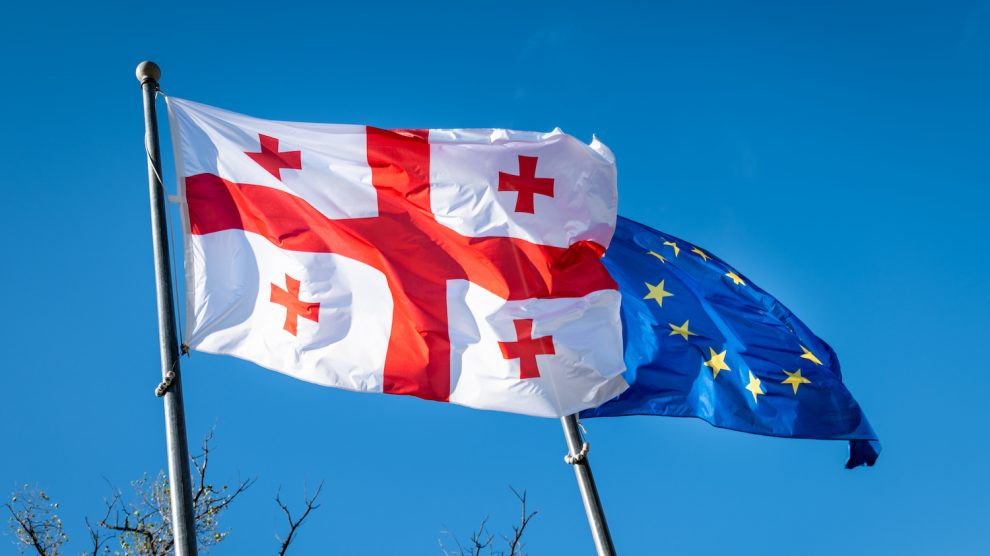Support for joining the EU remains high among Georgians, but a new ‘foreign agent’ bill threatens to derail Georgia’s path to EU membership.
Georgia takes its EU ambitions seriously. A poll taken in late 2022 found 85 per cent of Georgians support joining the bloc. A new constitution, adopted in 2017, makes work towards EU accession a constitutional obligation, saying, “The state constitutional bodies shall take all necessary measures to ensure Georgia’s full integration into the EU and NATO”.
- Georgia, once a beacon of democracy, is fading away
- Transit deals are complicating Georgia’s balancing act
- Explainer: What’s in an EU membership questionnaire?
Georgia, along with Moldova, formally applied to join the EU in March 2022 following Ukraine’s application in the immediate aftermath of Russia’s invasion.
However, while the EU granted candidate status to Ukraine and Moldova in June 2022, it gave Georgia 12 reform priorities on which to act to gain full candidate status. Two of these priorities were to “undertake stronger efforts to guarantee a free, professional, pluralistic and independent media environment” and “ensure the involvement of civil society in decision-making processes at all levels”.
NGOs at risk
A new bill proposed by the populist People’s Power offshoot of the ruling Georgian Dream party would designate media entities and civil society organisations that receive over 20 per cent of their funding from international sources as ‘agents of foreign influence’.
Critics within Georgia and abroad have said it threatens to end Georgia’s EU aspirations and chill dissent within the country.
“The government has been very critical of the NGOs and the mass media—especially in the last couple of years,” Bidzina Lebanidze of the Georgian Institute of Politics tells Emerging Europe. “I think adoption of these kinds of legislation could be a logical continuation of this process to further stigmatise and damage the image of non-governmental organisations and critical mass media.”
Lelo for Georgia, a centrist opposition party, called the bill “unconstitutional”, an “analogy to Russian law”, and “a clear sabotage of Georgia’s accession to the EU”. The president of Georgia, Salome Zourabichvili, also opposes the bill.
“For many Georgians, integration matters a lot. Therefore, for the government, it’s important that—if the process is stopped—it is done by the EU and not by the government officials themselves,” Lebanidze said when discussing the theory that the bill is intentional sabotage. “This could be another red flag in front of the EU if they adopt this bill. I mean, it’s a well-known fact Europeans are very sensitive towards this kind of thing.”
Universal opposition
The bill has been roundly criticised by all major international organisations.
The spokesperson for Josep Borrell, the EU High Representative for Foreign Affairs and Security Policy, said the law’s adoption would be “inconsistent with [EU integration] aspirations and with EU norms and values”.
The United Nations in Georgia said it “expresses profound concern that the adoption of the draft Law on Transparency of Foreign Influence would risk impeding the work of civil society and media and the essential contributions they make to Georgian democracy”.
Ned Price, spokesperson for the United States (US) Department of State, said, “We’re deeply concerned about its implications for freedom of speech and democracy in Georgia. We’ve expressed these concerns directly to the Government of Georgia now repeatedly”.
People’s Power claims that the US Foreign Agents Registration Act (FARA) was the inspiration for its bill, but Price rejected this idea, saying, “Statements that this legislation is based on our own FARA – those are patently false. In fact, the legislation as we read it seems to have roots in similar Russian and Hungarian legislation, not American legislation”.
Some 60 media organisations recently vowed to refuse to comply with the legislation, should it be passed.

A certain backlash
Two drafts of the bill have been introduced to parliament for a first reading. Georgian Dream sent the two drafts to the Council of Europe’s Venice Commission for its opinion and will wait to proceed until it hears from the Commission. The Georgian Dream party chairman said, regardless of the Commission’s opinion, “we will definitely adopt one or the other draft”.
If the bill is adopted and stalls Georgia’s EU accession, it is unclear how severely the Georgian populace will respond.
“We could expect a certain backlash, but on the other hand, the government so far has been quite effective in framing this within its polarisation narrative. The government has always managed to demonise the opposition,” adds Lebanidze.
“So far, this has worked quite well. If you look at public opinion surveys, the Georgian population is critical of the government, but they are more critical of the opposition. At the end of the day, I’m not sure whether this idea of European integration will be more important than domestic political issues”.
Unlike many news and information platforms, Emerging Europe is free to read, and always will be. There is no paywall here. We are independent, not affiliated with nor representing any political party or business organisation. We want the very best for emerging Europe, nothing more, nothing less. Your support will help us continue to spread the word about this amazing region.
You can contribute here. Thank you.







Add Comment